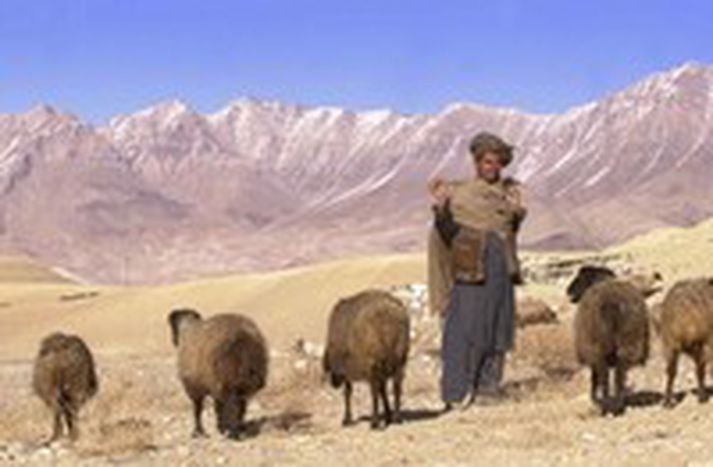
24 hours in Kabul
Published on
Translation by:
 sarah bowskill
sarah bowskill
Despite the missiles and cultural differences, NGO worker Claire Boyer has fallen in love with Afghanistan. Here, she gives an insight into the world of humanitarian aid workers in the country.
I left, after some dull law studies, in search of six months of “adventure” in the Afghan capital, working for a French charity. Two years later, I’m still here and in love with the country - except very early in the morning.
It is 4.30am and I have been woken, as usual, by the call to prayer. On the agenda for the day, a visit to a microcredit project in the countryside surrounding Kabul. That means a four hour journey on a rocky road and the feeling that you’re fighting a boxing match against the car. My co-worker has decided to give me a lecture on Afghan poetry, followed by a detailed account of the turbulent history of the last twenty years. Yet some international officials think it’s normal to say that the level of intellectual and social development of Muslims corresponds to Naw-Roz Tabrik, the current Muslim of 1384. Very telling.
A difficult job
Our arrival in the village is met by formal greetings from Afghan colleagues. I give in to the ritual niceties compulsory at every meeting: “How are you? Are you in good health? In good spirits? How is your family? And your children?” We gather for the meal eaten on the ground, sitting on cushions. On the menu: rice cooked in fat, a piece of meat swimming in oil, kidney beans and raisins. A meeting is planned with several local officials and the families of those who have benefited from the scheme to judge the impact of the microfinance project we have set up.
It’s quite normal to hear our hosts complaining for hours that the charity doesn’t introduce enough initiatives: “Since you are giving us micro credit; couldn’t you build us a well and buy a tractor too?”
The perception of charities in Afghanistan is split into two groups: on the one hand the ordinary people lament that the rebuilding of the country isn’t happening quickly enough and decry the corruption in some organisations (usually construction companies which assume charity status which makes it easier for them to get contracts from the backers and enables them avoid paying taxes on the profits…). But, when all is said and done, these people like the local charities which have repaired the irrigation channels.
On the other hand, there is the Taliban and Al-Qaeda, who blame the presence of the international community for all the problems in Afghanistan, killing a few of their kind whenever possible. Yet some of their complaints are legitimate: the arrival of a large number of charities in 2002 has caused problems in coordination. Besides, it is hard for an Afghan, after 25 years of war and misery, to see so many foreigners driving around in large vehicles looking as if they’re enjoying life but not being able to respond to the expectations of the population.
Humanitarian aid – a business like any other
It’s 3pm and it’s the fifteenth offer of tea today and the fifth I’ve accepted. It’s difficult to refuse Afghan hospitality. The women regularly ask me if I’m married. When I reply that I am not, they promise to pray that I’ll find a husband soon: “At your age [27], it’s time you were”. In a country where life expectancy is 42-years-old, it almost goes without saying.
We hurry to get back to Kabul before nightfall to dine with a financial backer of our project. The aim: to be very pleasant and always agree with the backer. There are few alternatives: if the charity’s finances dry up, you lose your job.
Humanitarian aid has become a business. Charities must be competitive, profitable and grow. This change is due to the financial backers and has been going on for a few years now, resulting in the professionalisation of the sector which was still in the Stone Age. Volunteers have been replaced by experts who have made crisis management and development their job, making humanitarian action more efficient. All medium sized charities (the majority) will either have to grow and become more professional or die. But the backers ask a lot of charities and give them few funds.
Security, alcohol and missiles
For aid workers, life isn’t as hard as it was just after the end of the war: showers have replaced the buckets of water and there is around-the-clock electricity. Notably, for the foreigners working for the United Nations, living quarters look like real islands of western comfort in the middle of a country in pieces. They can even eat in restaurants every evening by breaking a few security rules. But the possibilities for amusement are limited. An evening of open-air cinema with the international, young expatriate community of Kabul - which lives like it’s in New York and doesn’t care about the veil and local culture - is interrupted by missile fire. Everyone dashes to the bunkers. The risk of dying of claustrophobia, however, is greater than that from a stray bullet so they devote themselves completely either to work or to alcohol.
Tomorrow, at 4.30am the call to prayer will sound again. Why do I stay? To carry on learning about this culture that is so complicated, so contradictory and so surprising and to find out how the thriller novel that is the reconstruction of this country ends.
Translated from 24 heures à Kaboul


